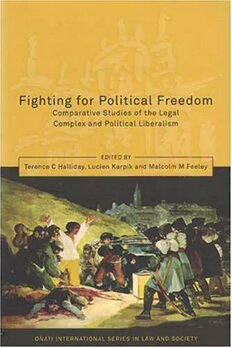
Fighting for Political Freedom: Comparative Studies of the Legal Complex and Political Change (Onati International Series in Law & Society) (Onati International Series in Law and Society) PDF
521 Pages·2008·10.096 MB·English
Most books are stored in the elastic cloud where traffic is expensive. For this reason, we have a limit on daily download.
Preview Fighting for Political Freedom: Comparative Studies of the Legal Complex and Political Change (Onati International Series in Law & Society) (Onati International Series in Law and Society)
Description:
Across the world, political liberalism is being fought for, consolidated, and defended. Nations that have never enjoyed a liberal political society are constrained or inspired by international institutions to create one. Nations that have advanced towards and then retreated from political liberalism are pressed to regain lost ground. Nations that have recently shifted from authoritarian to liberal political systems are encouraged to lock in the transition through institutions and constitutions. Mature democracies are being encouraged to recover diminished freedoms in the face of terrorism and domestic conflict. This book tests, for the contemporary world, the proposition that lawyers are active agents in the construction of liberal political regimes. It examines the efficacy of a framework that postulates that legal professions not only orient themselves to a market for their services, but they frequently can be seen in the forefront of actors seeking to institutionalize political liberalism. On the basis of some sixteen case studies from across the world, the authors present a theoretical link between lawyers and political liberalism having wide-ranging application over radically diverse situations in Asia, the Middle East, North America, South America, and Europe. They argue that it is not the politics of lawyers alone, but the politics of a 'legal complex' of legally-trained occupations, centered on lawyers and judges, that drives advances or retreats from political liberalism. Political liberalism itself is in play everywhere, in countries with established democracies and those without liberal politics. It is now clear that the legal arena is a central field of struggle over the shape of political power. The case studies presented here provide powerful evidence that the nexus of bar and bench in transitions towards or away from political liberalism is a force which has universal application.
See more
The list of books you might like
Most books are stored in the elastic cloud where traffic is expensive. For this reason, we have a limit on daily download.
